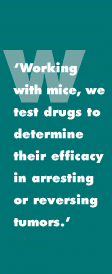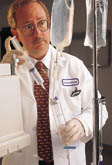 Searching
for new solutions The drugs that O'Donnell and his collaborators work on are not your usual cancer drugs. These drugs employ antibodies that specifically target cancer cells and have been tagged with radioactive particles called isotopes that can deliver lethal doses of radiation to tumor cells. Antibodies are proteins the body usually makes in response to an infection, such as the streptococcal bacterium that causes strep throats. They work through a lock-and-key mechanism that allows them to identify, lock onto, and neutralize the intruding agent. "Because the antibody is specifically targeted to the tumor cells, the radioactivity is much higher there, but it spares most healthy tissue so patients experience only minimal discomfort," he said. "There's no hair loss or nausea and vomiting. And patients don't have to be hospitalized." The antibodies that O'Donnell uses are called monoclonal antibodies because they are cloned from a single cell and are therefore identical. "We use them because we know they identify and lock onto cancer cells of a certain type," he said. "So if we are working with a patient with non-Hodgkin's lymphoma, we use an antibody we know will recognize these lymphoma cells."
Home |
Table of Contents |
To our Readers |
Building on Basics UC Davis Health System | © 2000, 2001, 2002 UC Regents. All rights reserved. |
  |
